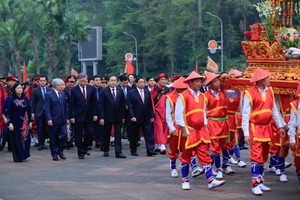When Tau left his hometown for a revolutionary base from where he and his comrades would fight the French colonialists, his young wife was pregnant. Thirty years later, when the country had defeated the Americans and achieved unification in 1975, Tau returned home and found he had a granddaughter. His faithful wife was still waiting for him.

Colonel and Hero of the People’s Armed Forces Nguyen Van Tau, known as Tu Cang or Tu Quang, said the love he felt for his beloved wife never seemed to wither in his heart during the 30 years of separation.
Narrating the story of their love, Tau recalls: “My hometown is in Long Phuoc Commune in Ba Ria Province. In early1946 I left home to take part in the Vanguard Youth Campaign. A few months later I was called back home and my parents forced me to marry a girl from the neighboring commune as they saw it as an effective way to keep me at home.”
The couple had never met each other before, Tau was 18 and his wife a year younger.
Love gradually blossomed in their hearts. One day Tau’s wife told him she was pregnant. But before they could fully experience the happiness this news brought, the French army invaded Long Phuoc. They killed innocent people and burned down houses.
Outraged by the enemy’s heinous crimes, Tau decided to join the resistance against the French. Since Saigon was still a safe place at that time, Tau had no choice but to tell his wife to go there and seek shelter for her and their baby while he was away from home.
To survive in Saigon, his wife had to sell her wedding ring and earrings to pay rent for her house. She registered for a typewriting course and later got a job as a typist in a small company.
In 1954 Tau was transferred to the North.
When he was about to climb on board, he was stopped by a stranger who gave him a package. Inside was a dark violet hand-knit jumper, a photo of Nhong, his seven-year-old daughter, and a letter which read, “I can’t come to see you off because the house is closely watched by the police. I knitted the jumper for you. Remember to wear it during the North’s chilly winter nights; it will keep you warm.”
Tau says he always kept his daughter’s photo, his wife’s letter, and the jumper in his rucksack. “I always put the jumper on my chest in bed. Its warmth made me feel as if my wife was with me.”
In 1961 Tau was ordered to go back to the South to work as a spy. Before leaving Ha Noi, he went to Trang Tien Shopping Center to look for a gift for his dear wife. The sales person showed him a Modavo watch for women and a Fortis for men.
“The two looked very similar, but the men’s watch was bigger. I decided to buy both for my wife and myself despite their fancy prices. A gold tael cost only VND 400 at the time, you know.”
He kept the Modavo safe in his rucksack and began what was a 100-day trek over the Truong Son Mountain to the South.
But Tau only got a chance to give his wife the watch a year later when she came to Boi Loi base in Tay Ninh Province to see him.
He recalls: “She brought our daughter with her and they stood waiting for me at the edge of the forest. I walked out in a black ba ba, a traditional Mekong Delta suit, with a gun on my hip. My appearance frightened our daughter and she nestled into her mother’s shoulder. That was the first time my daughter and I saw each other. She was already 16.”
After having a simple lunch together, Tau gave his wife the watch, perhaps the most precious gift he ever gave the faithful woman who had spent most of her youth bringing up their daughter alone.
Shortly afterwards, Tau shifted his operation to Sai Gon and he and his wife had the chance to meet each other more often.
They would meet at the Saigon Zoological and Botanical Garden, pretending to be friends from high school. They would exchange greetings, speak for a few minutes, and go their separate ways. The secret nature of his job did not allow him to take more risks.
On the night of April 30, 1975, soon after Sai Gon was just liberated, Tau drove downtown to Thi Nghe Market to find his wife and daughter, who were living in an apartment meant for employees of a bank.
He knocked at the door, calling their daughter’s name. The light inside the house was on and he recognized his wife’s quavering voice asking, “Is that you, honey? Are you home?”
The door opened and she rushed into his arms. They clung to each other. No one could say a word because tears were rolling down their faces.
Nhong woke up too and from the bedroom led out a small girl. She told her, “Say hello to your granddad, sweetie!”
The little girl opened her eyes wide at the stranger, too scared to say a word. Tau bent down to take his granddaughter in his arms.
























